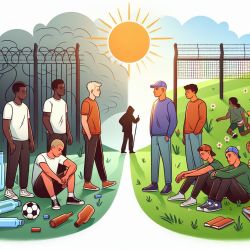Introduction
At TinyEYE, we are committed to providing exceptional online therapy services to schools. Our dedication to data-driven decisions ensures that we continually improve our services and outcomes for children. One insightful research article that can help us enhance our approach is "Implementation of antiretroviral therapy (ART) in former Soviet Union countries." This study provides valuable lessons on overcoming barriers and achieving successful implementation of critical health services, which can be applied to our own practices in online therapy.
Key Findings from the Research
The study by Amangaldiyeva et al. (2019) highlights several critical points about the implementation of ART in former Soviet Union (FSU) countries:
- Despite efforts from governments, there is a need for more targeted strategies to address high-risk behaviors and practices responsible for the continued transmission of HIV.
- Stigma against people who inject drugs (PWID), men who have sex with men (MSM), migrants, and people living with HIV (PLHIV) needs to be addressed.
- FSU countries need to gain independence in funding HIV care to avoid breaks in ART supply.
Applying These Insights to Online Therapy
While the context of ART implementation and online therapy services may seem different, the underlying principles of overcoming barriers and ensuring consistent service delivery are highly relevant. Here are some ways we can apply these insights to improve our online therapy services:
1. Addressing Stigma and Barriers
Just as stigma and social barriers hinder access to ART, similar issues can affect access to online therapy services. We must work to reduce stigma around speech and language disorders and promote inclusivity. This can be achieved through:
- Educational campaigns to raise awareness about the importance of speech and language therapy.
- Creating a supportive and non-judgmental environment for children and their families.
- Training staff to recognize and address potential biases and barriers.
2. Ensuring Consistent Service Delivery
The research emphasizes the importance of uninterrupted ART supply. Similarly, consistent and reliable access to online therapy services is crucial for achieving positive outcomes. To ensure this, we can:
- Implement robust scheduling and tracking systems to prevent missed sessions.
- Invest in reliable technology and infrastructure to minimize technical disruptions.
- Provide ongoing training and support for therapists to maintain high-quality service delivery.
3. Data-Driven Decision Making
The success of ART implementation in FSU countries relies heavily on data collection and analysis. We can adopt a similar approach by:
- Collecting and analyzing data on therapy outcomes to identify areas for improvement.
- Using data to personalize therapy plans and track progress.
- Regularly reviewing and updating our practices based on the latest research and data insights.
Encouraging Further Research
To continually improve our services, it is essential to stay informed about the latest research and developments in the field. We encourage practitioners to engage in ongoing research and professional development. By doing so, we can ensure that our practices are evidence-based and aligned with the best available knowledge.
Conclusion
The insights gained from the implementation of ART in FSU countries provide valuable lessons for improving our online therapy services. By addressing stigma, ensuring consistent service delivery, and making data-driven decisions, we can enhance our outcomes and create a positive impact on the children we serve.
To read the original research paper, please follow this link: Implementation of antiretroviral therapy (ART) in former Soviet Union countries.










